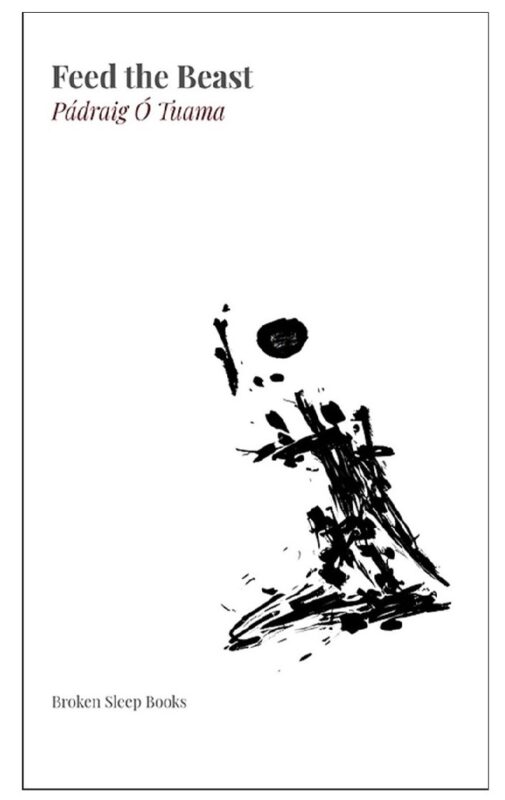REVIEW: PÁDRAIG Ó TUAMA’S ‘FEED THE BEAST’
By Stella Backhouse

In a 2020 interview for Belfast-based film-making charity esc films, Irish Poet and theologian Pádraig Ó Tuama spoke about the experience of being a gay man in the Catholic church: “I had to learn how to survive in a world that tried to split me. I was put through exorcisms, three of them, and then two years of reparative [conversion] therapy [delivered by someone who] was telling me terrible things about myself which weren’t true and which they hadn’t done any training for. They were making things up…that split me. Being gay didn’t split me.”
What struck me, having read Ó Tuama’s 2022 collection Feed The Beast, was how those words were amplified by the collection’s opening poem ‘The Butcher of Eden’. Implied in both interview and poem is the memory of an untroubled self before the split; followed by the perpetration of splitting; and then the state of living in a split self. ‘The Butcher of Eden’ is a retelling of the Genesis story. In Ó Tuama’s version, God makes for Adam and Eve coats from the pelts of slaughtered animals. He then turns to the animals’ meat and says “Eat./And watched while/beasts of Eden fed/on beasts of Eden”.
The sound of the split self devouring itself reverberates throughout the collection. In the fourth poem of ‘Seven Deadly Sonnets’ sequence, Ó Tuama obtains a Church-approved book on homosexuality and learns that ‘my desires are just urges to consume the thing I’m not,/that my lust for cock makes me a cannibal’. But as much as an exploration of the effects of splitting on the individual, the imagery in ‘The Butcher of Eden’ is also arguably a critique of the church itself, encouraging division amongst communicants as a means of exerting control. This mirroring of institution and individual re-emerges in ‘Magpie’, where the poet hears “my weeping in your throat/then you sang my song back to me, lulling me/into your sleep, the one that you took from me”. The instrument of splitting is the creation of self-hatred. In ‘Seven Deadly Sonnets’ (iii)’ Ó Tuama is explicit: “The way to break a man is to make him hate/himself”.
Ó Tuama deploys poetic form as graphic representation on his inner turmoil. The sonnet is used extensively to portray the confines of a narrow and strictly-enforced system within which the gay man inevitably wounds himself as he struggles to find the space he needs. ‘Seven Deadly Sonnets (iv)’ adds to this confusion when the poet’s mentor “after a chat where he’d asked about abuse…grabs my balls and/slaps my ass. He laughs it off, says all straight lads do this”.
This confusion continues in the anaphora of ‘Seven Deadly Sonnets (ii)’, where a spat-out ‘you’ and ‘your’ column, physically separated from the body of the poem, is marked by a telling slip: “your rejection of/Your nature, Your denial of y/our manhood and/Your hatred of the order of creation” – a hint, perhaps, that fear and denial of its own heart impels the church to scapegoat individuals? In tearing apart a Vatican pronouncement on homosexuality, the powerful erasure poem ‘There is a time to love…’, also uses form to make the point that human nature continues to exist despite shaming and silencing.
The hardening of struggle into anger culminates in ‘monster’, a full-throttle linguistic catharsis that smashes the grip of coercion that is “silent as abuse” by unleashing all the earthiest, most unambiguous terms for bodily functions: “I twisted prayers and shat on grace”; “I farted as I genuflected”; “So see me now you fucker”; “I take a piss to bless the ground”.
Thankfully, this cleansing opens the door to a more hopeful future. With the support of friends and exposure to Affirmation Theology, Ó Tuama is able to build a new relationship with both himself and his faith. In the concrete poem ‘Someone’, he seems to be tiptoeing away from a sexual encounter, still tormented by shame; but by the few last poems his ‘other self’ has become a kind of background saviour whose balancing influence kept him sane. He has found a partner, and a healing place within Christianity: “It comes with no demand. I enter/though the gate that has a sign that once said danger,/now says home”.
Feed The Beast is available to purchase online, direct from publisher Broken Sleep Books, as well as other bookshops and retailers.
